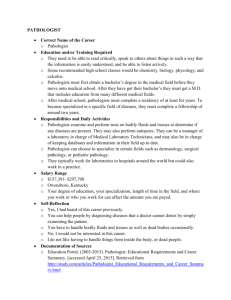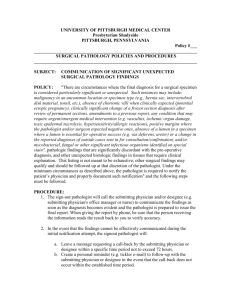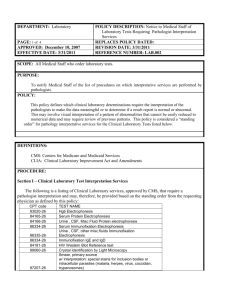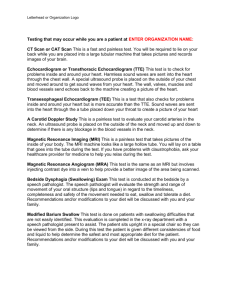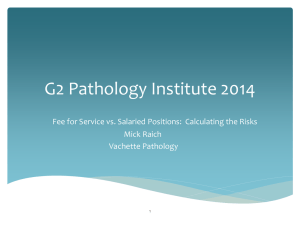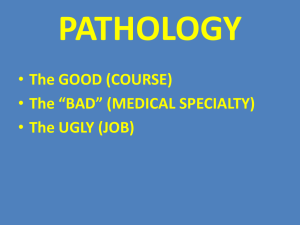career profile - WordPress.com
advertisement
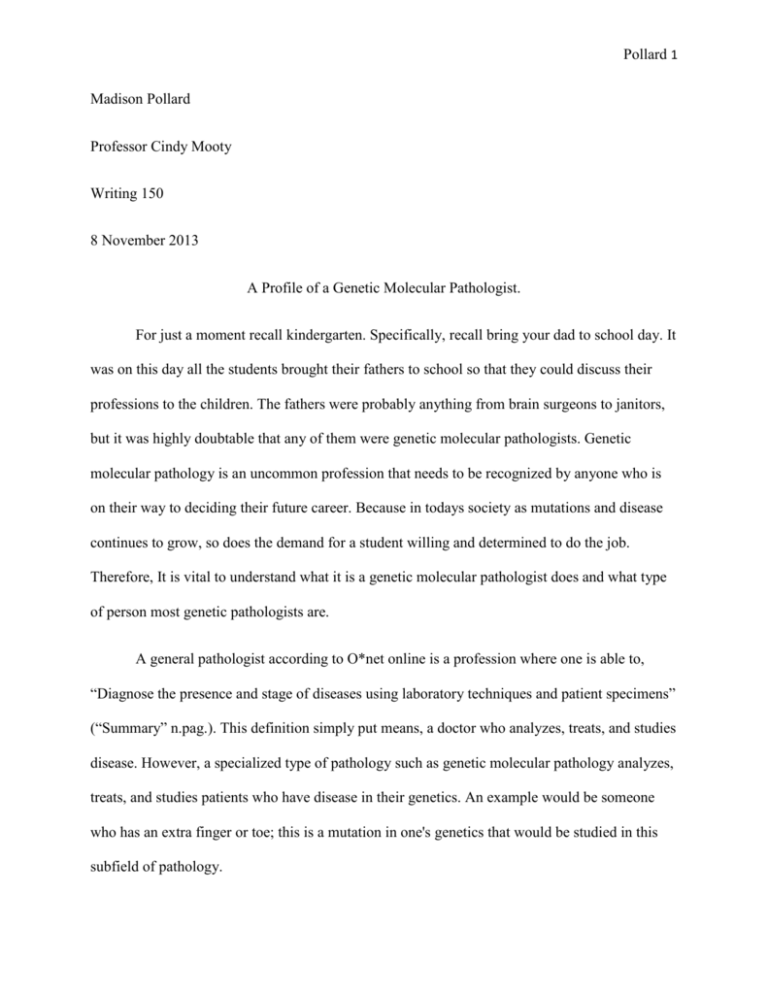
Pollard 1 Madison Pollard Professor Cindy Mooty Writing 150 8 November 2013 A Profile of a Genetic Molecular Pathologist. For just a moment recall kindergarten. Specifically, recall bring your dad to school day. It was on this day all the students brought their fathers to school so that they could discuss their professions to the children. The fathers were probably anything from brain surgeons to janitors, but it was highly doubtable that any of them were genetic molecular pathologists. Genetic molecular pathology is an uncommon profession that needs to be recognized by anyone who is on their way to deciding their future career. Because in todays society as mutations and disease continues to grow, so does the demand for a student willing and determined to do the job. Therefore, It is vital to understand what it is a genetic molecular pathologist does and what type of person most genetic pathologists are. A general pathologist according to O*net online is a profession where one is able to, “Diagnose the presence and stage of diseases using laboratory techniques and patient specimens” (“Summary” n.pag.). This definition simply put means, a doctor who analyzes, treats, and studies disease. However, a specialized type of pathology such as genetic molecular pathology analyzes, treats, and studies patients who have disease in their genetics. An example would be someone who has an extra finger or toe; this is a mutation in one's genetics that would be studied in this subfield of pathology. Pollard 2 At the University of Michigan, Ann Arbor there is such a pathologist named Dr. Elenitoba-Johnson. After studying for a duration of about 12 to 15 years of schooling, Dr. Elenitoba-Johnson was able to apply for the Department of Pathology at the University of Michigan and begin doing a career he still enjoys to this day. He stated, “To be a Molecular Pathologist, you need to go to Medical School, undergo residency training in Pathology, and undergo Sub-specialty training in Molecular Genetic Pathology” (Elenitoba) when describing the educational process for this career. This amount of education would be essential for such a career due to all the technology, reading and even writing used in this field. According to Dr. Elenitoba Johnson, there is a wide variety of different microscopes, DNA sequencing and hybridization used in his labs when conducting his research. When reading the different types of unfamiliar technology used in this profession, it is easy to see why such an education would be necessary in understanding what those different technological advancements do and achieve. He also stated, he uses writing and reading almost every day when educating both him and new employees on a multitude of things from reports to research findings. Although, 12-15 years is along time to take in the process of developing the knowledge and skills necessary for this career, it may pay off in the end. A genetic molecular pathologist's salary may range from high to low due to factors such as experience, location, or even whether one decides to complete the extra 3 years of schooling after the 12. However, according to O*net online, the median wages in 2012 for this career were about $90.00 hourly and ultimately $187,200 annually (“Summary” n.pag.). Likely, Big Future by the College Board also noted from the Bereau of Labor Statisitics that people in such a career received about $184,650 in 2011 (“Career” n.pag.). Agreeing with these sources it is safe to Pollard 3 predict a molecular genetic pathologist makes just below 200K. Making this much money a genetic molecular pathologist must work hard on a typical work day. Dr. Elenitoba-Johnson claims that an average day as a genetic molecular pathologist would consist of “meetings, teaching, research analyses, and molecular diagnostics” (Elenitoba). A more in depth analysis of tasks performed by someone in this profession is given by O*net online this organization lists some of the major tasks a genetic molecular pathologist does on a daily basis. They may use microscopes to examine specimens and determine if there is a mutation or alteration in their genes and then diagnose such a mutation or alteration if it exists. Then a pathologist would write a report about their findings from studying such a specimen and begin to draw conclusions. Using these reports a pathologist continues to conduct further tests and then ultimately communicates their results to other physicians to produce a treatment for patients (“Summary” n.pag.). Next important fact to know would be the job outlook for the future. Firstly, it was said on O*net online that nationally the projected growth rate of this job starting in 2010 and going through 2020 is said to be 20% to 28%, which is much faster than an average growth rate. Secondly, Dr. Elenitoba-Johnson claimed he saw the future for this field becoming a massive expansion with a high demand for jobs. He also claimed that this expansion may be due to the number of opportunities for advancement in this field such as: academia, industry, private enterprise, consulting…(Elenitoba). This profession will be able to continue expanding throughout the years as long as disease remains, especially disease in one’s genetics. While considering this career one should find the basic facts of salary, job outlook, and daily tasks vital, but one should also consider what type of person is right for such a job. O*net Pollard 4 online states that most pathologists are investigative and realistic people. It also states that most pathologists value achievement, independence, and recognition (“Summary” n.pag.). Therefore, It is most likely that Dr. Elenitoba-Johnson is this type of person. He believes the personal qualities necessary for this job are “discipline, persistence and organization” (Elenitoba). These traits also match with the traits given on Careerinfo.net. This site continues to list qualities such as active listening, critical thinking and deductive and inductive reasoning as being essential for those considering a career in pathology (“Pathologist” n.pag.). It is necessary to know what type of person one is, to understand whether or not such a job is right for them. When Dr. Elenitoba-Johnson was asked if he could do things all over again, would he go back and choose the same path for himself he replied, “I would change nothing. It has been fantastic” (Elenitoba). The certainty he has about his decision to assume this career is something every person, especially students should have when they first decide on their careers. Even if the first day they decide on them, is on bring your dad to school day. With such certainty, one can be able to enjoy their profession from the first day of the job to the very last. Pollard 5 Works Cited “Career: Pathologist.” Big Future by the College Board, 2013. Web. 8 Nov. 2013. Elentoba-Johnson, Kojo. Email Interview. 7 Nov. 2013. “Pathologist.” Occupational Profile. Career One Stop Pathway to Career Success, 2013. Web. 8 Nov. 2013. “Summary Report For: 29-1069.07-Pathologists.” O*Net Online, 2011. Web. 8 Nov. 2013.
